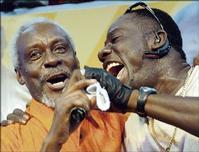
Rudolph Brown/Chief Photographer
Leroy Sibbles (right), singing 'I Shall Be Released' with Prime Minister P.J. Patterson at the 67th annual conference of the People's National Party held at the National Arena on September 11. Sibbles has been honoured abroad.
Kavelle Anglin-Christie, Staff Reporter
A prophet is seldom without honour, save in his own land.
Those in the music fraternity believe this is the reason why a Reggae Hall of Fame was never established in Jamaica.
There are reports that one had been started in the early 90s, but soon quietly fell apart for want of support.
Veteran selector and musicologist, Bunny Goodison, is one of the many persons saddened at the situation.
Preserving the history
He says although reggae is celebrated across the world and is Jamaica's largest export, there is nowhere in the island dedicated to preserving the history of reggae music.
"Of a country of 2.5 million people, it is highly unlikely that we would have a respected art form that the world accepts. Canada does not have any music to call their own. Neither does Britain, as large as it is and the United States only has jazz. So
(a Reggae Hall of Fame) is more than important; it is necessary. It is the most popular brand name out of Jamaica. No other product out of Jamaica is more known and loved," Goodison said.
An example of this passion is the number of visitors who come to shows such as Red Stripe Reggae Sumfest annually.
Yet the contributions of the long-standing artistes seems to fall through the cracks off stage.
Marley on 'walk of fame'
However, this is not the case internationally.
Many Jamaican artistes have been inducted into halls of fame outside the island, such as the Caribbean Hall of Fame, the Walk of Fame in Hollywood and the Rock and Roll Hall of Fame.
Bob Marley was given a star on Hollywood Boulevard's Walk of Fame on what would have been his 56th birthday, February 6, 2001, was inducted into the now defunct Reggae Hall of Fame in 1990 and the Rock and Roll Hall of Fame in 1994.
Marley, along with Ken Boothe, Dennis Brown, Leroy Sibbles and Peter Tosh, are just a few of the Jamaican artistes who have been inducted in the Caribbean Hall of Fame.
"I don't know why we shouldn't have one. Our music is a unifying force. It cuts across political classes and social lines. Another reason why something like this is important is to show the people who have assisted and sustained the music against social ills," said Goodison. "... During the 50s and 60s the music was not something that you could play uptown. It was when the offspring of these snobbish upper class people in those days went to school and that sort of thing and mingled with the children from downtown and the middle class that caused them to be aware of the music. So it has done a lot for the socialisation of the people."
Goodison shared a piece of reggae history, which he says many may not know, helping to make his case for a of a Reggae Hall of Fame.
"Back in the 1950s and 60s there were a lot of sound clashes, so some artistes didn't want to put their names and information on the records and the radio wouldn't play it without it. They said it was illegal, because usually you need to know who the record belongs to for royalty purposes, so they wouldn't play them. So you found that the music was only being promoted in the dances downtown," Goodison said.
"These artistes suffered long and hard to get reggae music out there, until it is at the stage it is now, so why not honour them?"
According to Teddy Laidley, an entertainment consultant, "the only thing we have close to a Hall of Fame is Chris Blackwell's place in Ocho Rios, down by Island Village... So a lot of people don't understand the struggle of the music that they went through in the past."
He said the collection that Roger Steffens, a reggae historian, had of Marley's work is both an example of the love others have for reggae and the fact that we do not chronicle our own musicians' lives.
That collection, however, was bought last year by National Commercial Bank's CEO, Michael Lee-Chin.















